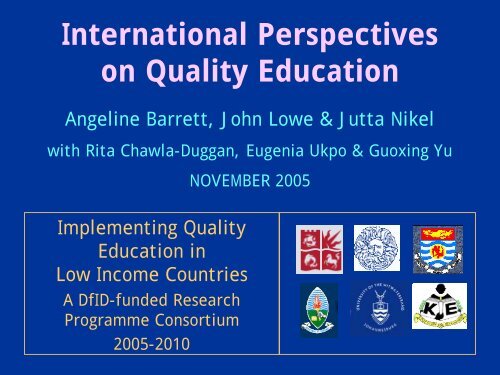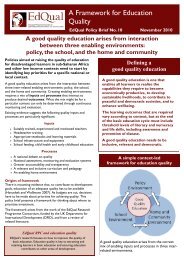QUALITY EDUCATION is ⦠- EdQual
QUALITY EDUCATION is ⦠- EdQual
QUALITY EDUCATION is ⦠- EdQual
You also want an ePaper? Increase the reach of your titles
YUMPU automatically turns print PDFs into web optimized ePapers that Google loves.
International Perspectives<br />
on Quality Education<br />
Angeline Barrett, John Lowe & Jutta Nikel<br />
with Rita Chawla-Duggan, Eugenia Ukpo & Guoxing Yu<br />
NOVEMBER 2005<br />
Implementing Quality<br />
Education in<br />
Low Income Countries<br />
A DfID-funded Research<br />
Programme Consortium<br />
2005-2010
<strong>QUALITY</strong> <strong>EDUCATION</strong><br />
<strong>is</strong> (framed by) …<br />
effective<br />
efficient<br />
sustainable<br />
equal<br />
relevant
McDowell, 2002 (East Timor); Michaelowa, 2001 (Sub-Saharan<br />
countries); Akkari, 2005 (Tun<strong>is</strong>ia); Romano, 2002 (Europe)<br />
State<br />
OECD<br />
PRIORITIES Africa: by democracy, type peace, of state poverty<br />
Post-conflict;<br />
newly founded<br />
Low Income<br />
Middle income<br />
eradication, sustainable<br />
development, protecting<br />
Emphas<strong>is</strong> environment within (UN’MDG, quality 2003) debate<br />
Subs<strong>is</strong>tence, security, trust –school<br />
system, curriculum<br />
Access, livelihoods (coping; lasting;<br />
flexibility) – primary schools<br />
Continuation – secondary school<br />
D<strong>is</strong>advantaged groups<br />
Competencies, responsibility, life-long<br />
learning, sustainability<br />
Responsibility for freedom & equity expanded to<br />
future generations (UN’s DESD, 2005)
EFFECTIVE means . . .<br />
achieving goals.<br />
Individual:<br />
Nation:<br />
Humankind:<br />
Preparation for work<br />
Self-fulfilment<br />
Economic growth<br />
Social cohesion<br />
Human development<br />
Human rights<br />
(Hawes & Stephens , 1990; Chitty, 2002; Delamonica et al., 2004)
EFFICIENT means . . .<br />
making the most of inputs to<br />
achieve goals.<br />
Efficient <strong>is</strong> usually applied to goal of<br />
student learning as indicated by:<br />
• students completing BE cycle without<br />
repetition.<br />
• Performance in national examinations or<br />
international tests.<br />
(Lockheed & Verspoor, 1991; EFA GMR 2005)
Effectiveness<br />
What are the goals?<br />
Are the goals set out<br />
achieved?<br />
(Oramas, 2003; Dahlberg, 1999)<br />
Efficiency =<br />
outputs<br />
inputs (resources;<br />
costs)<br />
Are the goals set<br />
out achieved in the<br />
most resource<br />
efficient way?
MODEL FOR EFFECTIVENESS<br />
inputs<br />
curriculum<br />
materials<br />
teachers<br />
learners<br />
nutrition<br />
home culture<br />
pre-school<br />
System management<br />
school processes<br />
LEARNING<br />
context<br />
social, cultural, economic<br />
outputs<br />
academic<br />
achievement<br />
participation<br />
social skills<br />
economic<br />
success<br />
i<br />
n<br />
d<br />
i<br />
c<br />
a<br />
t<br />
o<br />
r<br />
S<br />
?<br />
(Lockheed & Verspoor, 1990; Heneveld, 1994)
E<strong>QUALITY</strong> - rationale<br />
‣ Quality education <strong>is</strong> a human right;<br />
‣ Quality education supports human<br />
development & poverty reduction;<br />
‣ Quality education promotes social<br />
cohesion, social diversity, peace, human<br />
security etc.<br />
Is equality financially affordable?<br />
Is inequality affordable to<br />
society?<br />
(Michaelowa, 2001; Chapman, et.al.1996)
E<strong>QUALITY</strong><br />
<strong>is</strong> usually understood as . . .<br />
girls (or boys)<br />
certain ethnic groups<br />
d<strong>is</strong>abled<br />
street children<br />
uneducated youth<br />
the very poorest<br />
A focus on groups that are d<strong>is</strong>advantaged in<br />
terms of access and achievement.<br />
i.e. indicator of quality!<br />
?<br />
From our review of World Bank & UNESCO literature
RELEVANT<br />
Education For What?<br />
What <strong>is</strong> considered as relevant by whom?<br />
How <strong>is</strong> a dec<strong>is</strong>ion made?<br />
Relevant for the present and/or for the future?<br />
But these depend on national<br />
priorities, cultural values and<br />
philosophies of education.
Sustainable means<br />
adding thoughts about time and future<br />
Quality education....<br />
‣ has a lasting effect<br />
‣ can be continued into the future<br />
‣ aims at “empowering people of all<br />
ages to assume responsibility for<br />
creating and enjoying a sustainable<br />
future” (UN’s MDG, 1993, p.2)
A different way to look at quality education<br />
Capability approach<br />
‘Development as freedom’<br />
to think, talk and act<br />
Quality education – “to<br />
concerning ones’ values<br />
build human capacity<br />
not only for<br />
employability, but for<br />
broader lifelong<br />
learning as well as for<br />
adaptive and<br />
‘coping’ livelihood<br />
strategies in a fast<br />
moving and<br />
complicated world.”<br />
(Sen, 1999,Nussbaum, 2000)<br />
(Lawrence & Tate, 1997)<br />
Quality education –<br />
“the obligation to<br />
establ<strong>is</strong>h and<br />
sustain the conditions<br />
for each and every<br />
individual, irrespective<br />
of gender, ethnicity,<br />
race, or regional<br />
location, to achieve<br />
valued outcomes”<br />
Livelihood approach<br />
Livelihood can include food,<br />
health, a strong family, wealth<br />
and income.<br />
(Chambers, 1993, 1997)
In defining educational quality, then,<br />
we don’t look only to outcomes … or<br />
to any other single or multiple set of<br />
parameters but to the harmonious<br />
interplay of all of these within the<br />
classroom, the institution, and the<br />
culture as a whole.<br />
(Biggs, 1995)
DISCUSSION POINTS<br />
‣ What indicators are used? Where do<br />
indicators need to be developed?<br />
‣ Which groups are d<strong>is</strong>advantaged and<br />
are there initiatives targeted at<br />
these?<br />
‣ Do your priorities coincide with those<br />
in international literature? How do<br />
they differ?




